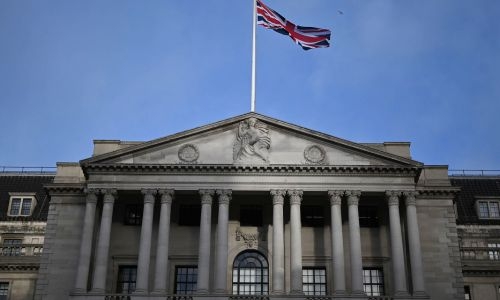Bank of England faces rate-hike dilemma
AFP | London
The Bank of England is expected to raise its key interest rate for a 15th straight time Thursday but the possibility of a pause has surfaced after a surprise dip in UK inflation.
The BoE had been widely tipped to raise borrowing costs again heading into this week's monetary policy meeting until official data Wednesday on consumer prices in August clouded the outlook.
The BoE meeting comes at a busy week for global central banks, which have tightened their monetary policies in efforts to tame inflation that surged following Russia's invasion of Ukraine last year.
The US Federal Reserve held interest rates steady on Wednesday but indicated another hike is likely in 2023 to tackle inflation, with fewer cuts than anticipated in 2024.
Ahead of the BoE meeting, Sweden's Riksbank and Norway's Norges Bank each raised their key interest rates by a quarter-point on Thursday.
However, the Swiss National Bank unexpectedly left its rate unchanged, confounding expectations for an increase.
All three, however, warned that more tightening may be required as inflation stays high.
- Hike 'cast into doubt' -
All eyes were now on the Bank of England, which may still choose to raise its key rate to 5.5 percent from 5.25.
However, "what had seemed like a sure thing is cast into doubt", noted Danni Hewson, head of financial analysis at AJ Bell.
"Moments after the shock inflation number was released, the market expectation of a Bank of England rate rise began to plummet."
The Consumer Prices Index eased to 6.7 percent last month from 6.8 percent in July.
That was the lowest since February 2022 and confounded expectations for an acceleration to 7.1 percent on higher energy prices.
Following the data, a Bloomberg survey of analysts showed another rate hike was a 50-50 chance.
A fresh BoE hike would put its borrowing cost at the highest level since the start of the global financial crisis more than 15 years ago.
Central banks have tightened borrowing costs to multi-year highs as worldwide inflation soared following Russia's invasion of Ukraine, with energy and food prices surging.
The European Central Bank has carried out 10 straight rises, including a quarter-point hike last week, but is now signalling that eurozone borrowing costs may have reached a peak.
It comes as data this week showed eurozone inflation slowed slightly in August.
- Cost-of-living crisis -
UK inflation struck a 41-year peak at 11.1 percent in October 2022, while the BoE is tasked by the British government with keeping the level at about two percent.
In a bid to cool prices, the BoE began lifting its key interest rate from a record low of 0.1 percent at the end of 2021, when inflation started to creep higher as economies slowly emerged from lockdowns.
The increases have worsened a cost-of-living crisis, with retail banks following suit by significantly hiking mortgage rates.
Landlords, faced with higher repayments, have in turn pushed up rents by sizeable amounts.
At the same time, banks are offering higher returns on savings, for those who can afford to set money aside.
Related Posts

